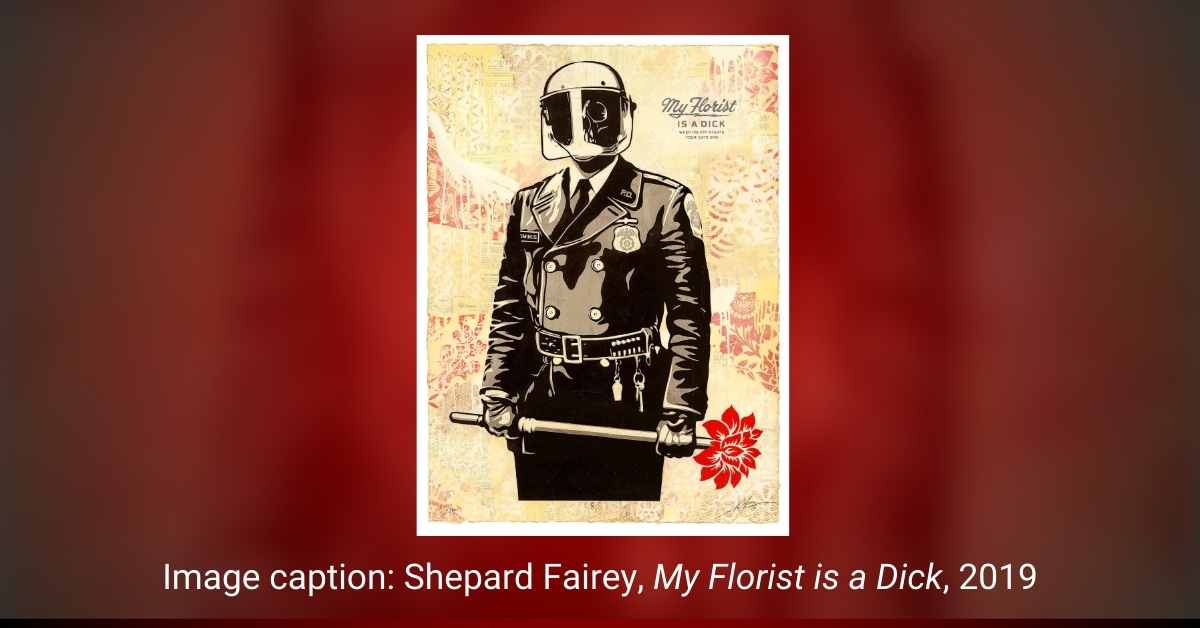MESA, ARIZONA – Today, the National Coalition Against Censorship’s (NCAC) Arts and Culture Advocacy Program (ACAP) and the ACLU of Arizona released a joint statement responding to the City of Mesa’s pledge to exercise greater control over artistic content in future exhibitions at Mesa Arts Center, which may lead to the prohibition of artwork that is deemed “controversial” or “
NCAC and ACLU Arizona released the following joint Statement:
Responding to objections from community members, artists, and civil liberties groups, the City of Mesa has agreed to allow the display of an artwork that is critical of police at the Mesa Art Center.
But it is too early to celebrate a victory for artistic freedom because city officials indicate they aim to exercise greater control over artistic content in future exhibitions. The National Coalition Against Censorship and the American Civil Liberties Union of Arizona are deeply concerned that this means the city will prohibit art that expresses controversial ideas or views critical of government agencies.
In a public letter last month, NCAC and ACLU-AZ decried the City of Mesa’s abrupt “postponement” of the Mesa Art Center’s 2023-24 exhibitions. The reason for the postponement was city administrators’ dislike of one particular artwork by artist Shepard Fairey titled My Florist is a Dick, which expresses criticism of police violence. Following unsuccessful efforts to omit the work from Fairey’s solo exhibition, city administrators attempted to strongarm the entire contemporary art museum into hosting a yearlong project celebrating Mesa itself.
Though Mesa city officials heeded the joint letter’s request to immediately reinstate the exhibitions, they appear to have willfully ignored its message, which focused on the importance of supporting the artist’s right to express his views and the public’s right to access a wide range of perspectives at the Mesa Art Center.
Instead, in news interviews and the city’s press release, administrators attempt to distract from the issue by belaboring so-called “process-related deficiencies at the Museum” and a need to “update artist contracts, exhibit curation policy and the prospectus submission process” despite there being no evidence that existing policies ever resulted in exhibition delays. Moreover, recent news coverage reveals that city officials specifically intend for new policies to prevent the future exhibition of artworks that might offend the city’s police officers.
If city officials truly want to “support art and speech in all forms” and “recognize and support the ongoing national dialogue about policing in America,” as they claim, that would mean supporting the future display of critical works like Fairey’s rather than seeking tighter administrative oversight to ensure they don’t get selected in the first place. Similarly, the decision to add a disclaimer to Fairey’s contested work is inappropriate, especially considering that a similar sign exists near the museum’s entrance and would appear to already apply to all artworks on view.
The city’s focus on expanding its oversight of the museum signals that future exhibitions at Mesa Art Center will be scrutinized to ensure no artworks challenge or criticize government employees, agencies, policies, and initiatives, essentially limiting the Mesa Art Center’s offerings to works that help bolster the city’s image and its attendant PR strategies.
This is not supporting “art and speech in all forms.” Measures like these will threaten to turn Mesa’s contemporary art museum into a government-sanctioned propaganda center.
National Coalition Against Censorship
Since its inception in 1974, the National Coalition Against Censorship (NCAC) has functioned as a first responder in protecting freedom of expression, a fundamental human right and a keystone of democracy. Representing 59 trusted education, publishing, and arts organizations, NCAC encourages and facilitates dialogue between diverse voices and perspectives, including those that have historically been silenced.
American Civil Liberties Union of Arizona
The American Civil Liberties Union of Arizona is the state’s premier guardian of liberty, working daily in the courts, Arizona Legislature, and communities statewide to defend and preserve individual rights and freedoms guaranteed to all by the Constitution and the laws of the United States and Arizona. It advances equity and dismantles systemic injustice by taking legal action, influencing policy, and mobilizing our communities to protect the civil rights, liberties, and dignity of all Arizonans.


